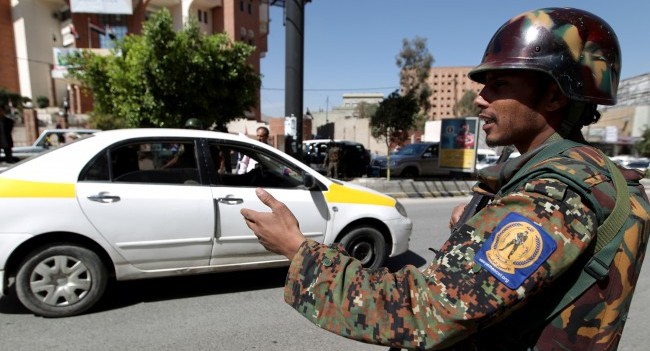
A Yemeni soldier mans a checkpoint in Sana’a on 23 January 2013. Source: MOHAMMED HUWAIS/AFP/Getty Images
At the same time, there was a major reorganisation of Yemeni Armed Forces, involving the amalgamation of the neo-Saddamist Republican Guard into the regular Yemeni Army, and the creation of a Strategic Reserve Force. This move came on top of the previous phases in spring and summer 2012, when other kinsmen and clients of the former President Ali Abdullah Saleh were also removed from their posts. To discourage another mutiny by former regime loyalists, the US put a shot across the bows of the Sanhanis. The youth—and many of the more independent politicians—were delighted, as Saleh’s clique (as well as Ali Muhsin, whom many distrust just as much) not only lost formal influence, but also their ability to siphon off huge sums from the Yemeni defense budget through “ghost soldiers” and ration rip-offs.
The rumour that Ahmad Ali may be appointed to governor of the Central Military Region will therefore have come as a body blow to all who had hoped to have seen the last of the Sanhani clique. And yet it is a price that must be paid if Yemen is to avoid civil strife of the sort that engulfed Iraq when Jerry Bremer dissolved the entire Iraqi Army at a stroke and sent trained and equipped military men into the insurgency. While US Ambassador Feierstein’s interventions undoubtedly irritate many who wish to see real democracy in Yemen, the US brake on the situation comes as a result of bitter—and bloody—experience, summarized in the soldiers’ phrase, “Better to have him in the tent urinating out, than out of the tent urinating in.” Ahmad Ali’s appointment to Central District is not as lucrative as a command on the Saudi border (where he could run his own smuggling operations, and “tax” others’ concerns) but it is probably valuable enough to keep him and enough of his family with a stake in Yemen as it is. The alternative involves funding his clients himself, which is expensive even after two decades of embezzling funds.
There is, however, a further lesson to be drawn from SSR in Iraq: that the constitution must not enable the president to aggregate both political and military power together, or the system of checks and balances will fail. While President Hadi has shown himself to be as honest as could be hoped—his appointment of many of his southern kin and colleagues, the Zumra, probably owes more to self-protection than to patronage—he has said that he is stepping down at the end of his term. Whoever succeeds him must not find all the levers of power neatly consolidated into a ready-made tyrant’s toolbox. Yemenis have suffered too much for their state to stumble from nepotistic despotism into tyranny in the name of security.
